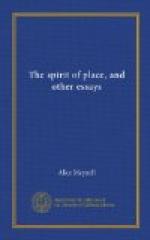The foot, with its articulations, is suppressed, and its language confused. When Lovelace likens the hand of Amarantha to a violin, and her glove to the case, he has at any rate a glove to deal with, not a boot. Yet Amarantha’s foot is as lovely as her hand. It, too, has a “tender inward”; no wayfaring would ever make it look anything but delicate; its arch seems too slight to carry her through a night of dances; it does, in fact, but balance her. It is fit to cling to the ground, but rather for springing than for rest.
And, doubtless, for man, woman, and child the tender, irregular, sensitive, living foot, which does not even stand with all its little surface on the ground, and which makes no base to satisfy an architectural eye, is, as it were, the unexpected thing. It is a part of vital design and has a history; and man does not go erect but at a price of weariness and pain. How weak it is may be seen from a footprint: for nothing makes a more helpless and unsymmetrical sign than does a naked foot.
Tender, too, is the silence of human feet. You have but to pass a season amongst the barefooted to find that man, who, shod, makes so much ado, is naturally as silent as snow. Woman, who not only makes her armed heel heard, but also goes rustling like a shower, is naturally silent as snow. The vintager is not heard among the vines, nor the harvester on his threshing-floor of stone. There is a kind of simple stealth in their coming and going, and they show sudden smiles and dark eyes in and out of the rows of harvest when you thought yourself alone. The lack of noise in their movement sets free the sound of their voices, and their laughter floats.
But we shall not praise the “simple, sweet” and “earth-confiding feet” enough without thanks for the rule of verse and for the time of song. If Poetry was first divided by the march, and next varied by the dance, then to the rule of the foot are to be ascribed the thought, the instruction, and the dream that could not speak by prose. Out of that little physical law, then, grew a spiritual law which is one of the greatest things we know; and from the test of the foot came the ultimate test of the thinker: “Is it accepted of Song?”
The monastery, in like manner, holds its sons to little trivial rules of time and exactitude, not to be broken, laws that are made secure against the restlessness of the heart fretting for insignificant liberties—trivial laws to restrain from a trivial freedom. And within the gate of these laws which seem so small, lies the world of mystic virtue. They enclose, they imply, they lock, they answer for it. Lesser virtues may flower in daily liberty and may flourish in prose; but infinite virtues and greatness are compelled to the measure of poetry, and obey the constraint of an hourly convent bell. It is no wonder that every poet worthy the name has had a passion for metre, for the very verse. To him the difficult fetter is the condition of an interior range immeasurable.




